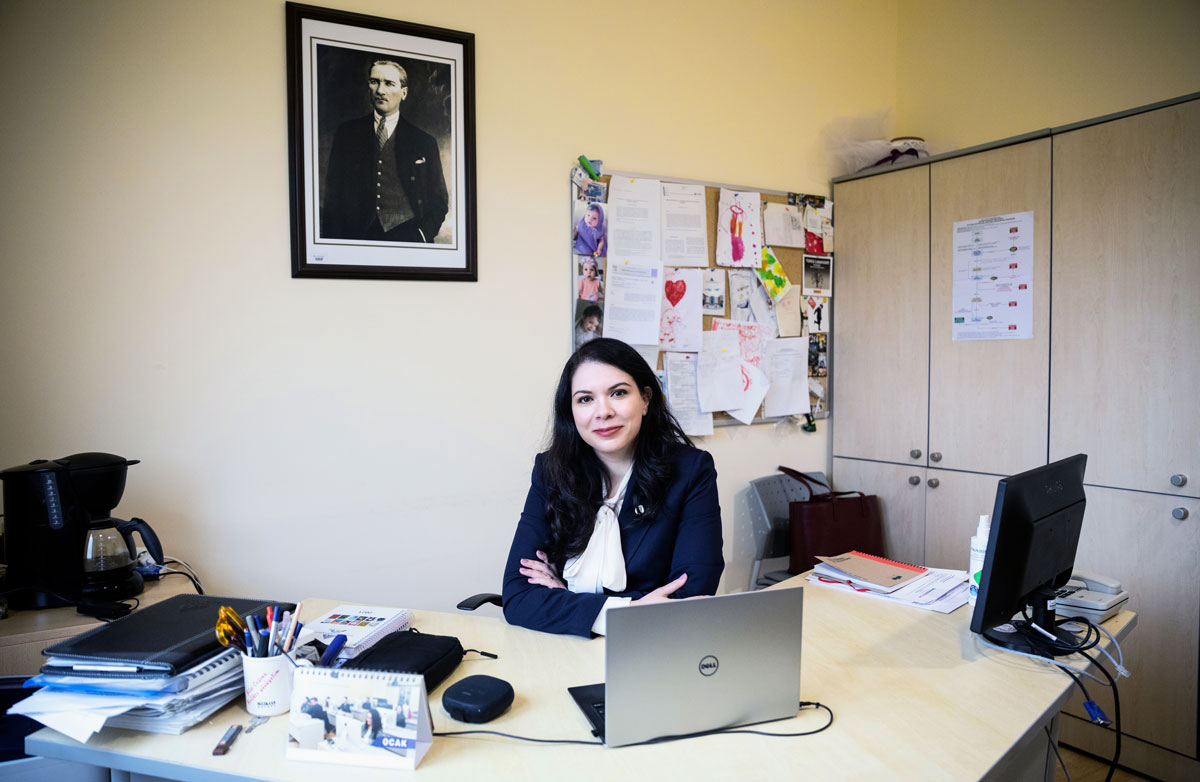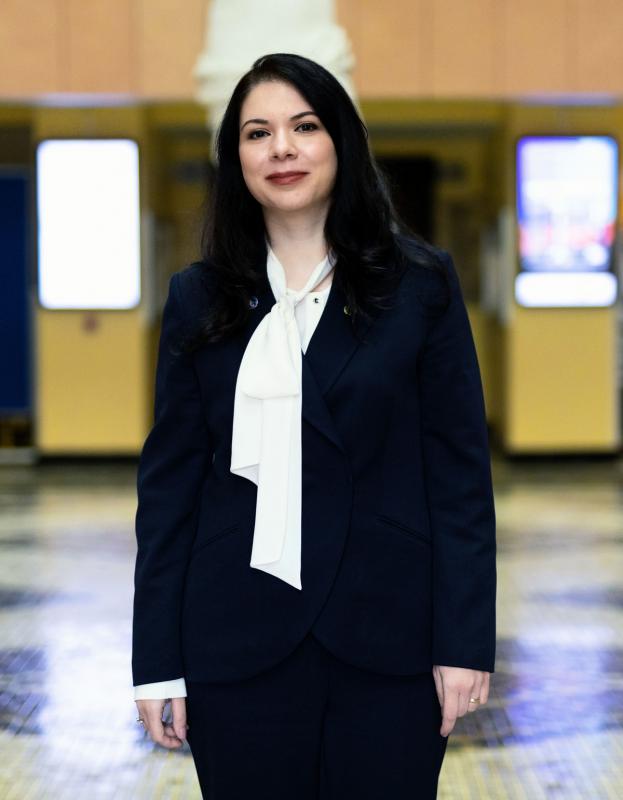Mathematics is the Key to Life for Him
Dr. Prof. İlknur Kuşbeyzi Aybar is working as an executive in the project entitled ''The Dynamic Analysis of Biochemical System via the Use of Computational Algebra Methods'' which is being realized by virtue of a cooperation between TÜBİTAK and The Slovenian Research Institute. In this project, Aybar is trying to unlock the biochemical systems with the key provided by mathematics.
“As a Mathematician, I Serve All Disciplines”
Mathematics is a nightmare for a lot of people. For the Deputy Chair of the Institute of Educational Sciences of Yeditepe University, Assoc. Prof. İlknur Kuşbeyzi Aybak, however, it is a way to understand Nature. She expresses all of the events in nature from the migration of birds to the breathing of a leaf and the digestion of sugar with mathematical equations and tries to solve them by the use of mathematical models.

Beginning her scientific work with joint projects with Europe, Assoc. Prof. İlknur Kuşbeyzi Aybak, initially took part as a researcher in the bilateral cooperation project of TÜBİTAK and Ukraine and realized researching is ''incredibly enjoyable'' for her. Then, between 2014 and 2016, she became the executive of a project carried out by TÜBİTAK and the world-famous, Slovenia based research center Center of Applied Mathematics and Physics (CAMTP). Today, Aybar is executing a project which is supported by the Slovenian Resarch Council - ARRS and TÜBİTAK, entitled ''The Dynamic Analysis of Biochemical Systems via the use of Computational Algebra Methods''.
Aybar says, “As a mathematician, I serve all disciplines. Solving the problems of our time requires multidisciplinary projects, computational sciences and mathematics are at the center of these projects in question,”.
Dr. Prof. answered our questions.
Can we get to know you a little bit?
I have bachelor's and master's degrees in Mathematics from Yıldız Technical University and a doctoral degree in Mathematics from Gebze Technical University. I started working as a research assistant in the Department of Information Systems Technologies at Yeditepe University during my master's degree in 2005. Then, after receiving my PhD in 2010, I started working as an assistant professor in the Department of Computer and Educational Technologies of the Faculty of Education and I am currently working as a faculty member in the Department of Elementary Mathematics Teaching. I teach computer and mathematics classes at the undergraduate level. At the same time, I have been working as an assistant director at the Institute of Educational Sciences, where I have been teaching at the graduate level since 2019.
“My Life Changed When I Joined the Family of Yeditepe University''
What was your reason for choosing Yeditepe University for an academic career?
I have been working at Yeditepe University for 16 years. My life changed when I joined the Family of Yeditepe University and I took a step towards academic life. I have found an opportunity to work with very valuable teachers. I am proud to be a part of the Yeditepe University because of the value it gives to people, its technological facilities, its nature friendly-campus and how it holds success in high regard. This year is the 25th anniversary of the establishment of our university, an event which we feel proud to be celebrating. I am very happy to have the opportunity of observing the strengthening of the capacity of scientific research, technology and community service of our university closely and I feel elated to be the part of this ascendancy. Thanks to the foresight of the esteemed founding president Bedrettin Dalan, my esteemed rector Prof. Dr. Dr. Canan Aykut Bingöl, my esteemed Dean, Prof. Dr. Ayşe Semra Aykel and my esteemed Institute Director Prof. Dr. Servet Bayram's constant support regarding my research I am feeling very, very lucky.
Do you have a life motto? What are the factors that make you successful?
I believe the importance of determination and a drive to achieve a goal in order to be successful in my studies. I often see the benefit of making a step-by-step progress towards my goal with an approach of ''divide-and-conquer'' used in order to divide the problem into achievable sub-goals when necessary.
“My Hobbies Have Led Me to Computational Sciences”
Have there been any areas other than your own that you think have contributed to you in your career process?
I believe that literature, music and all branches of art have a positive impact on scientific research, as well as on other subjects. I also see the importance of hobbies in order to find the inner drive which is necessary for work and success. I really like reading books, watching theaters and especially musicals, participating in artistic activities, playing a musical instrument, and I try to devote as much time as possible to it. I think that improving my programming skills at an early age and reading books in English have had positive effects on my academic career. I was using TI-BASIC for programming when I was a toddler. When I was high school and college I loved reading science fiction. I used to play the guitar and the violin. I believe that my hobbies developed my analytical skills therefore leading me to basic and computational sciences. Now I play the piano with my daughter and son. We also love sing block-based programming apps such as Scratch Jr.
Have you been inspired by anyone?
The achievements of our women researchers are an inspiration for me.
Have you encountered any difficulties in your career process? How did you overcome all this?
It can take a long time to get the results of scientific studies. In this case, it is very important to continue working and maintain stability. I am also trying to achieve a better standing by evaluating my work and comparing it with the state of their affairs in last year.
''We are to Present Mathematical Findings''
You have a project that you are implementing with TÜBİTAK. Can you talk about this?
We have carried out our bilateral project of TÜBİTAK which I am serving as the executive with the participation of valuable researchers from the world-famous Center for Applied Mathematics and Theoretical Physics (CAMTP) located in Slovenia, Maribor. Our first bilateral TÜBİTAK cooperation project with the CAMTP was succesfully completed between 2014 and 2016. Our second project, which has been accepted by TUBITAK and the Slovenia Research Institute (ARRS) to be supported between 2019 and 2022 is a continuation of our first project. In this project entitled ”Dynamic Analysis of Biochemical Systems using Computational Algebra Methods,
as you know, biochemistry serves as a discipline aimed at the discerning the interactions of the internal mechanisms of living organisms. The chemical reactions necessary for plants, animals and microorganisms to maintain their vital activity are crucial.
Biochemical reactions, just like a lot of events in the natural sciences such as physics, biology and chemistry can be expressed with mathematical equations and they can be modelled mathematically. Although events such as glicolysis, photosynthesis, cellular respirations are subjects of biochemistry, when these are modelled in a mathematical fashion and when we solve their equations we can understand these events as well. It is as if we have conducted hundreds of thousands of experiments.
Since 1920, there are models and equations put forward regarding the solutions of the phenomena in Nature. But some of these equations cannot be solved. There are equations that cannot be solved, especially in more advanced, complex cases.
Methods of computational algebra are quite strong approaches for unsolvable polynomial equations/models. The computational algebra that we use, the methods of “limit cycle analysis”, are aimed at the further simplification of these unsolvable models. But as they turn into simpler versions of themselves the qualitative characteristics of the systems are preserved and thanks to this we can find solutions for them.
In this project we are to present general mathematical findings related to the qualitative behaviour of biochemical processes. It will serve for those who are employed in the fields of biochemistry and bioengineering.
Can this approach be used in different areas as well?
Yes. We are studying biochemical systems within the scope of the TÜBİTAK project. In another study, we proposed to apply the same approach to the nerve cell with the participation of our esteemed teachers from Yeditepe University Faculty of Engineering. We specifically conceived this idea for diseases such as Alzheimer's, ALS, Parkinson's, which are classified as neuro-degenerative diseases. We have created a “limit cycle” by the methods of computational algebra. The results obtained from these projects have been published in leading journals in the world. Now we are planning to conduct its experiment.
I am thankful for the Dean of the Faculty of Engineering, Prof. Dr. Ahmet Arif Ergin, Head of the Department of Genetics and Bioengineering, Prof. Dr. Fikrettin Şahin, the Director of the Institute of Health Sciences, Prof. Dr. Bayram Yılmaz.
In addition, I am participating in the working group ”Numerical Methods and Applications“ within the action of European Cooperation in Science and Technology - COST which is supported by the European Cooperation in Science and Technology (2019-2023) entitled as ”Mathematical Models for Interacting Dynamics on Networks - MAT-DYN-NET".

“I Believe in the Importance of Cooperation”
What has been effective in starting the studies you have carried out with TUBITAK?
I think that my joint work with Europe has been very effective in my turning to scientific studies. My main goal was to satisfy my curiosity and to learn new things. Research is an incredibly enjoyable job for me. I believe in the importance of cooperation in terms of sharing information. Cooperation is also at a high level in the research process, and this is also very enjoyable.
What kind of impact has the Covid-19 pandemic had on your workfield?
It did not distrupt our work on a serious level. We have ensured continuity in our cooperation activities with the help of video conferencing platforms. Our findings were presented at online-held conferences due to the pandemic.
What are your predictions about the future of your field of study?
There are mathematical models of all phenomena in nature, from the migration of birds to the flow of water. For a mathematician, it doesn't matter what the event actually is. All events can be expressed by mathematical equations. I can also base my mathematical approach on biochemistry and the nerve cell. Solving today's problems requires multidisciplinary projects, and computational sciences and mathematics are central to these projects. And I think this will keep on happening.
'' I like traveling to different countries''
What does travel mean to you? What is your favourite city both in Turkey and around the world? And why?
I really like to travel to different countries. When you work at a research center in Europe, you can get rid of all the fatigue of your work by doing research during the day and having dinner with the co-researchers you work with throughout the evening. Heidelberg in Germany and Maribor in Slovenia have been the two cities I've liked the most and I'm looking forward to revisiting them again.
What do you recommend for young people who want to move towards becoming researchers?
It takes quite long for a scientific research to bear fruit. I suggest those who want to become researchers that hey should be ready to work without interruptions for a long time, not to lose their faith and not to lose their motivation when conducting research on a subject. The main thing is to work constantly, without departing from the light of science and scientific ethics, and not to divert from the goal itself.
I also recommend our young friends to learn how to use social media correctly by increasing their literacy on this field.